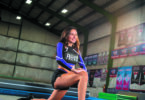 Whether you’re a high school or college athlete or a weekend warrior, you’re probably aware of the dangers of an ACL tear. The ACL, or anterior cruciate ligament, connects your thigh bone to your shin and is located in the knee. Many actions can cause an ACL tear, such as colliding with another athlete, twisting your leg while running or even a car or bike accident.
Whether you’re a high school or college athlete or a weekend warrior, you’re probably aware of the dangers of an ACL tear. The ACL, or anterior cruciate ligament, connects your thigh bone to your shin and is located in the knee. Many actions can cause an ACL tear, such as colliding with another athlete, twisting your leg while running or even a car or bike accident.
“Right after the injury people will often report they felt or heard a ‘pop,’” says Kristen Herbst, DO, orthopedic surgeon at UHS Sports Medicine. “The hallmarks of the injury are a lot of swelling, pain and feeling like your knee is giving out.”
Dr. Herbst explains that it’s important to get this injury treated as soon as possible for the best outcome, and that is where the Micah Orthopedics BEAR® Implant comes in. This brand-new technology, just approved by the FDA in 2021, is an implant that heals the ACL without using a tissue graft from the patient’s body, which is the way ACL tears are treated traditionally.
“This means there is no issue with a donor site,” says Dr. Herbst. “Traditionally, when we take a tendon from somewhere else on the body, not only does that cause pain, but it also takes time to recover, which ultimately delays the return to play. The BEAR implant eliminates the pain and weakness athletes sustain when we take a graft.”
Beyond avoiding a painful graft, the BEAR implant also produces a better result. “Nothing beats your native anatomy—it’s what you were born with,” Dr. Herbst explains. “We’re able to take what’s left of your ACL and get that to heal. Comparing one knee to another a year after surgery, a BEAR implant looks almost exactly the same as an uninjured knee, while you can clearly tell a difference with a traditional reconstruction.”
After a BEAR implant procedure, athletes will go through a rehabilitation program similar to that used after traditional reconstructive surgery. Dr. Herbst notes that UHS makes this easy through the multidisciplinary collaboration between surgeons and physical therapists at the hospital.
“It’s a huge benefit, and it shows that UHS is committed to the Sports Medicine service line,” she says. “Having that support behind us gives us the ability to take care of athletes and other patients at every level. It’s very exciting.”
BACK IN ACTION
Find more information about the BEAR implant for ACL tears and the UHS Sports Medicine program.







